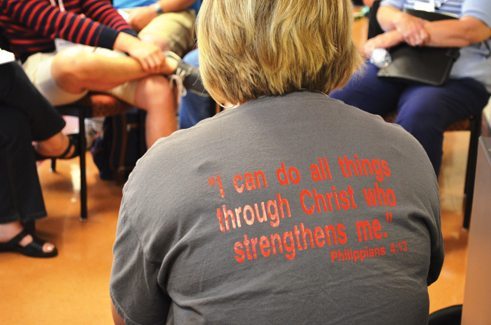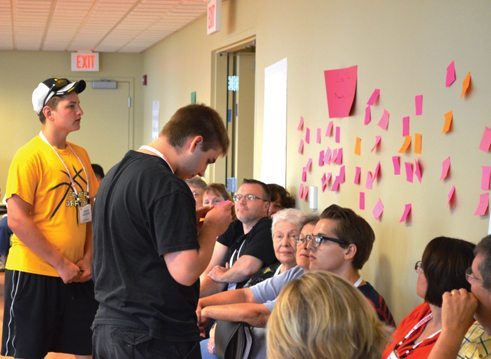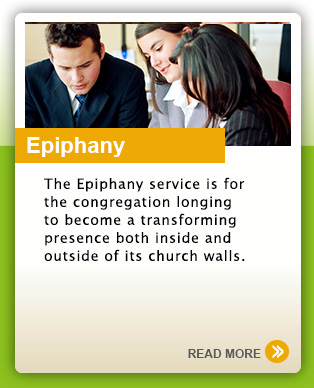 By Rick Morse, Vice President for Congregational Services
By Rick Morse, Vice President for Congregational Services
Hope Partnership for Missional Transformation
After two years of research, design, partnership and piloting with more than 70 Disciples congregations, a Hope Partnership service called THE JOURNEY is making an impact on leaders, congregations and communities throughout the United States and Canada.
Design of The Journey process started almost immediately after a Leadership Summit was held in Indianapolis in 2009. Participants, who included seminary, Regional, and general ministry partners and high-impact transformational pastors, all agreed on the basic principles that congregational transformation happens when leaders themselves are transformed and that transformational leadership is different from other forms of leadership.
“It became clear to all of us,” says Rick Morse of Hope Partnership, “that learning to be a transformational leader is like learning how to swim. You can read all the books you want, but you have to experience it in your setting.”
The summit resulted in collaboration with Higher Education & Leadership Ministries, Disciples Home Missions, the Fund for Theological Education and Disciples Women to create an experiential process that guides lay and clergy leaders through a two-year transformative process, Region by Region.
The Journey takes proven processes in a unique combination to help in the formation of transformational leaders. Using coaching, experiential learning, peer groups and cohorts of congregations working together, congregations are making major strides in their transformation.
The results have been greater than expected:
- A congregation in St. Louis, whose leaders talked about great ideas yet rarely pulled the trigger, launched an attraction event in just seven days that attracted more than 250 people.
- A church in Illinois, who realized they had been paralyzed by fear of failure, proclaimed they will no longer let fear make their future decisions.
- A Sunday school teacher in North Carolina shifted from teaching Sunday school because the church needed someone to do it, to claiming as her ministry impacting the spiritual formation of children. This change in attitude has reenergized her teaching and that of others in their congregation.
- A church in Gallatin, Mo., started a monthly community supper for the hungry and lonely in their community. They now serve more than 300-400 people each month. All the food is donated, volunteers come from all over the town and other churches pitch in. The program is coordinated by young adult Journey participants, who had never been given leadership opportunities before.
- A church in Arizona eliminated seven committees and reduced their board by 50 percent, enabling leader volunteers to focus their energy in new ways other than going to meetings.
- A church in North Carolina no longer runs their board meetings by reporting. Instead, they focus on prayer, witnessing to where they are seeing God at work in their community and asking the question, “How can we be the hands and feet of Jesus here?”
Leaders who participate in The Journey are surprised by their transformation. One church leader, who was a West Point graduate and career military officer, found the transformation almost immediate. In the first Experience retreat, he observed that he had never been taught the skill of listening to others. So, although he was full of ideas in one of the activities, his group could not complete their task because he did not listen to them. By the end of the second retreat weekend, he shared with the group that he is a different leader now as a result of this process and cannot wait to see the results back home.
This is not uncommon. Mark Irons, a doctoral candidate in Texas, quantified immediate changes in leadership ideals held by leaders in the process. By probing participants before and after each retreat, he discovered their attitudes and ideals had changed.
 The transformational process requires letting go of old ideas and assumptions. According to Otto Scharmer, an MIT theorist whose work has greatly influenced Hope Partnership, the transformational process involves some deconstruction of ideas and a redirected focus in order to become effective.
The transformational process requires letting go of old ideas and assumptions. According to Otto Scharmer, an MIT theorist whose work has greatly influenced Hope Partnership, the transformational process involves some deconstruction of ideas and a redirected focus in order to become effective.
A pastor in Missouri stated that she was well aware of this need to help her congregation let go of old assumptions. However, she knew she would not be the person to do it. She stated that having outside resource people made all the difference in the world. That’s where the value of peer groups resides.
Peer groups (called CARE groups) for pastors are an essential part of The Journey process. The Journey employs a trained Care Group host to work with a CARE group four times a year. Hosts are primarily marriage and family therapists, who are well versed at facilitating these processes by asking skillfully formed questions.
The peer group evaluations have exceeded expectations. Pastors report that they are leery at first of the time commitment these groups take, but after a short time, they begin to see the value of this kind of collaboration.
“There are countless stories of transformative work that takes place as pastors support one another,” says Linda Gardner, who coordinates the dozen active groups.
Lilly Endowment research supports the effectiveness of these groups, noting that pastors engaged in a peer group outperform their colleagues. The research also indicates that professionally led groups do even better.
While some congregations whose leaders have participated in The Journey do better than others, there is no denying that the transformational process has begun at some level in every Journey church. Even the most skeptical congregations find themselves on the path to change and a promising future.



